#1880s Russia
Text



Green velvet court dress, ca. 1888, Russian.
By Charles Frederick Worth.
Indianapolis Museum of Art at Newfields.
#Indianapolis museum of art at Newfields#green#velvet#court dress#court attire#1880s#1888#1880s Russia#Russian#extant garments#womenswear#dress#silk#19th century#1880s dress#1880s court#1880s extant garment#charles frederick worth#house of worth
141 notes
·
View notes
Text
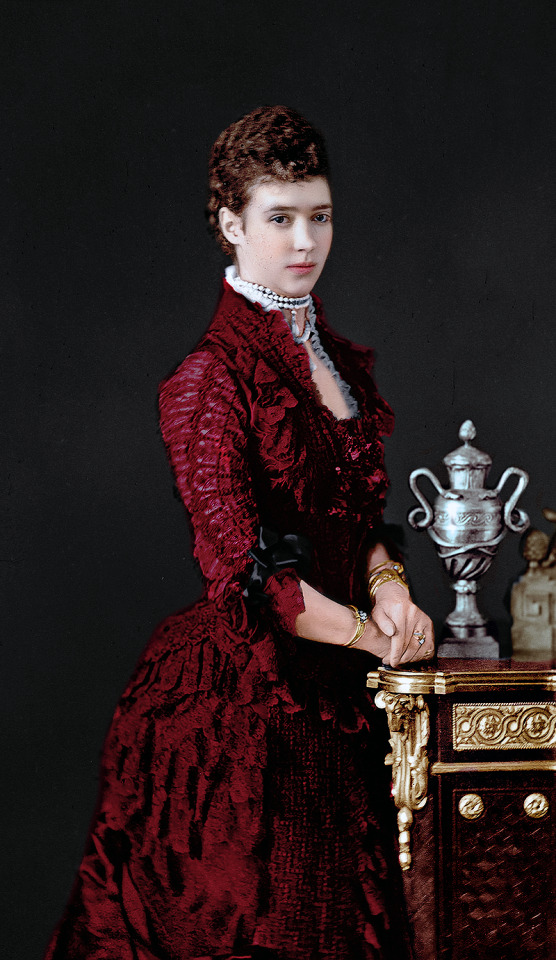
Empress Maria Feodorovna of Russia (Princess Dagmar of Denmark), mother of the last Russian Tsar, early 1880s.
#russian imperial family#imperial russia#imperial family#romanovs#victorian#colored photography#history colored#empress maria feodorovna of russia#empress maria of russia#empress maria feodorovna#princess dagmar of denmark#dagmar of denmark#danish royal family#danish royalty#1880s fashion'#1880s#1882
142 notes
·
View notes
Text
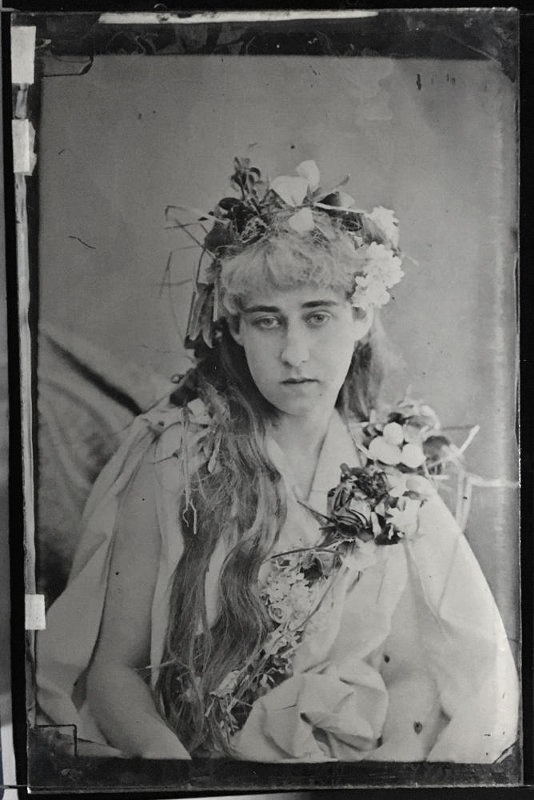
Portrait of an unknown woman,Nizhniy Novgorod (1870s/1880s)
Photography by Andrey Karelin (1837-1906)
#Россия#Russia#vintage#photography#Нижний Новгород#Nizhniy Novgorod#русское искусство#russian art#art#portait#русский фотограф#russian photographer#photographer#Андрей Авинов#Andrey Karelin#woman#russian#Europe#history#beauty#unknown#black and white#european#vintage photography#1870s#1880s#19th century
80 notes
·
View notes
Text

Portrait of an Elegant Lady with a Fan, Konstantin Egorovich Makovskij. 1883.
#art#aesthetic#art history#victorian aesthetic#victorian#fashion#historical fashion#gilded age#historical art#women in art#the gilded age#Russian art#imperial Russia#beautiful fashion#Victorian fashion#1880s#1880s fashion#gilded age fashion#historical gown#historical dress#gowns#dresses#tulle#tulle fashion#portrait#historical costuming
119 notes
·
View notes
Text
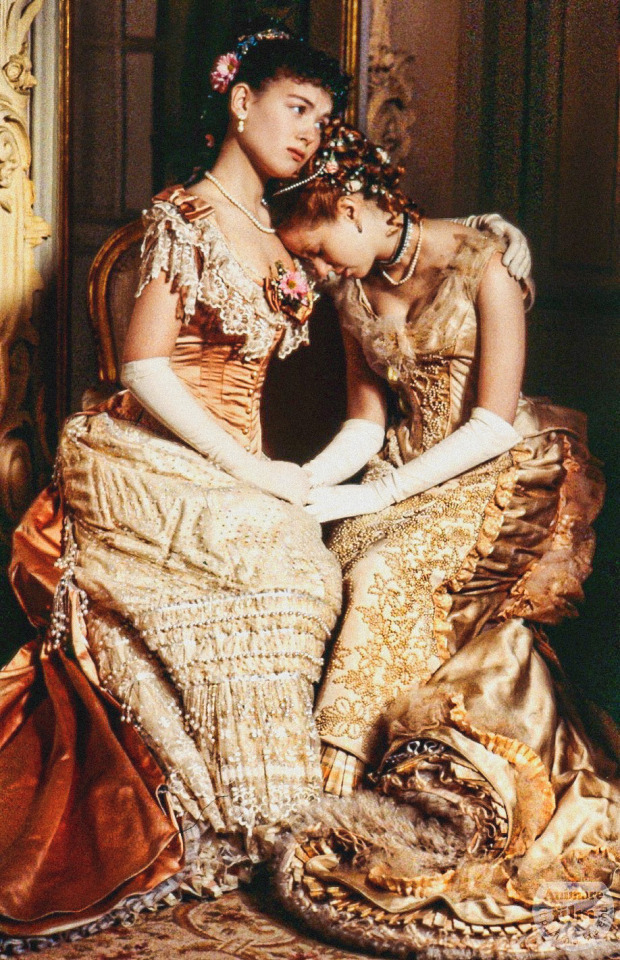
Anna Karenina (1997) dir. Bernard Rose
#source: historical beauty lily#period drama#perioddramaedit#19th century#curls#imperial russia#leo tolstoy#anna karenina#Anna Karenina 1997#mia krishner#saskia wickham#1880s#1880s dress#1880s fashion#19th century fashion#kitty#dolly#aesthetic#1800s aesthetic#edit#period costumes#costumes#embroidery#redhead
80 notes
·
View notes
Text

Greta Garbo as Anna in Anna Karenina 1935 🪽
#old hollywood#beauty#romantic drama#1930s cinema#historical drama#greta garbo#fredric march#basil rathbone#freddie bartholomew#maureen o'sullivan#anna karenina#1880s fashion#russian high society#russia#leo tolstoy
10 notes
·
View notes
Text
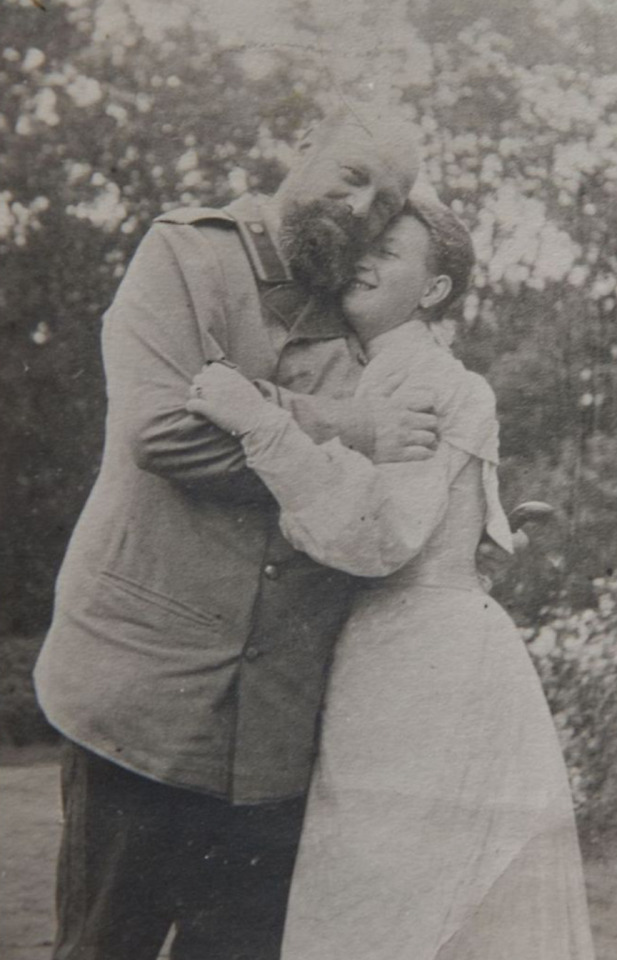
Candid photo of Tsar Alexander III of Russia with his niece Princess Marie or “Minnie” of Greece and Denmark, late 1880s-Early 1890s
Source: Pinterest
#tsar alexander iii#Princess marie of Greece and Denmark#maria georgievna#grand duchess maria georgievna#alexander iii#late 1880s#1890s#romanov#imperial russia
20 notes
·
View notes
Text
god I LOVE finding queer shit in my genealogy research, take a look at this poor priest in 1880s Russia describing people in this one village:
"However, it cannot be said that the people were not trusting of me. In Myagkoe^, I managed to destroy a tradition of dressing up for a wedding and playing the role of a jester. How ridiculous this custom was one can judge for themselves, from the fact that women would dress in men's clothes, and men in women's, and, going about the village, would tumble and tell all sorts of jokes that would make the crowds laugh. This custom still remains in these villages: Klemovo, Bezzubovo^^, Kosyaevo, Kalimeno ... "
Now, why might the village people not be trusting of this guy? WELL:
"For five years I was the priest at the village Myagkoe ... and for five years I fought against the superstitious belief that had rooted itself in the people to, in the evening, for the celebrations of Mid-Pentecost, jump over fire ... I took every possible measure to try and stop this custom. I urged in the church, in homes, and in the school for people to forget it, explaining the harm that comes from it, but found myself helpless against this stubborn superstition ...
I would ask the people, particularly the elders: 'Have you really never had pastors in this village, who would explain this custom and its harms to you?' And they would answer: 'The priests tried as much as they could, but couldn't do anything with our people. Father Feodor tried the hardest to destroy the tradition of jumping over fire - he gave the instructions himself, would tell the village elder to chase the people away, but nothing worked'. "
It does make me a little sad that the priest apparently succeeded in stopping the cross-dressing,,,but also knowing the fact that they didn't give in on the fire-jumping point, I think this may have been a case of "is he drunk yet?? ok let's go >:)"
-----
^meaning "Soft [neuter]"
^^literally, "Teethless"!
Source of all this goodness: ТУЛЬСКІЯ ЕПАРХІАЛЬНЫЯ ВѢДОМОСТИ. 15-го Октября 1890 года № 20. Or in English: the Tula Diocesan Gazette, 15th of October 1890, issue 20.
(original text below the cut! I shortened the original for this post, so if you're comfortable reading (typed) old orthography Russian, I'd recommend a read.)

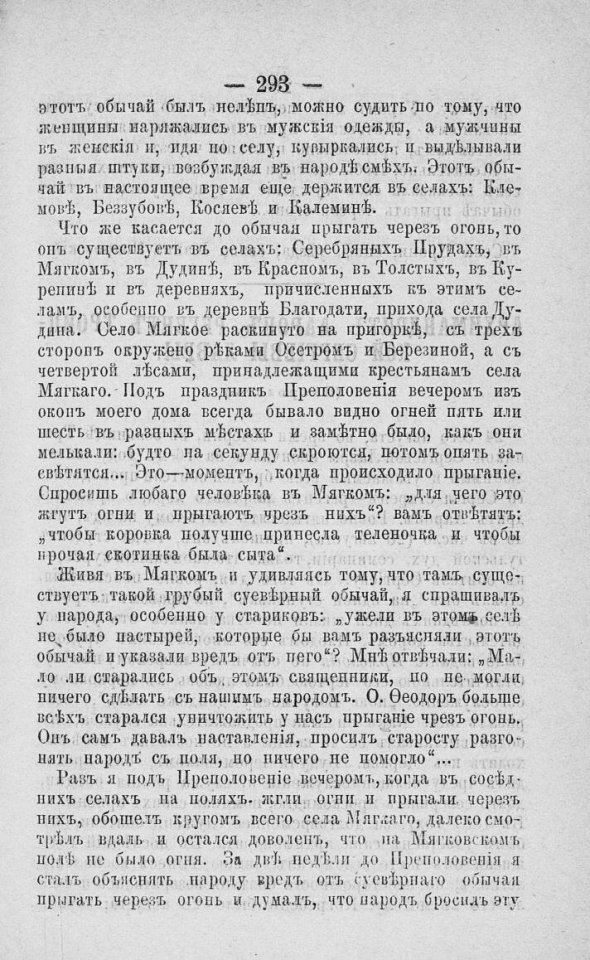

Image ID Start: ДОПОЛНЕНІЕ КЪ СТАТЬѢ: "СУЕВѢРНЫЙ ОБЫЧАЙ ВЪ ВЕНЕВСКОМЪ УѢЗДѢ", ПОМѢЩЕННОЙ КО ВЪ 18 Л. Т. Е. В. ЗА 1890 Г.
Пять лѣтъ я былъ священникомъ въ селѣ Мягкомъ, веневскаго уѣзда, отстоящемъ отъ села Серебряныхъ Прудовъ на разстояніи четырехъ верстъ и пять лѣтъ я боролся съ суевѣрнымъ обычаемъ, укоренившимся въ простомъ пародѣ прыгать черезъ огонь, вечеромъ, подъ праздникъ преполовенія, и нчего не сдѣлалъ. "Что же вы намъ не даете хода и запрещаете повеселиться и прыгать черезъ огонь, бывало скажетъ кто-либо изъ парода, когда въ сосѣднихъ селахъ не уничтожаютъ этого?" Съ моей стороны были приняты всевозможныя мѣры къ искорененію этого обычая. И въ церкви, и въ домахъ и въ школѣ я внушалъ бросить этотъ обычай, объясняя вредъ, отъ него происходящій, но оказался безсильнымъ въ борьбѣ съ этимъ упорнымъ суевѣріемъ. Нельзя сказать, чтобы народъ былъ недовѣрчивъ ко мнѣ. Въ Мягкомъ удалось мнѣ уничтожить обычай наряжаться на свадьбѣ и разыгрывать изъ себя роль шута. На сколько
этотъ обычай былъ нелѣпъ, можно судить по тому, что женщины наряжались въ мужскія одежды, а мужчины въ женскія и, идя по селу, кувыркались и выдѣлывали разныя штуки, возбуждая въ народѣ смѣхъ. Этотъ обычай въ настоящее время еще держится въ селахъ: Клемовѣ, Беззубовѣ, Косяевѣ и Калеминѣ. Ӕвгыдо Что же касается до обычая прыгать черезъ огонь, то онъ существуетъ въ селахъ; Серебряныхъ Прудахъ, въ Мягкомъ, въ Дудинѣ, въ Красномъ, въ Толстыхъ, въ Курепинѣ и въ деревняхъ, причисленныхъ къ этимъ селамъ, особенно въ деревнѣ Благодати, прихода села Дудина. Село Мягкое раскинуто на пригоркѣ, съ трехъ сторопъ окружено рѣками Бестромъ и Березиной, а съ четвертой лѣсами, принадлежащими крестьянамъ села Мягкаго. Подъ праздникъ Преполовенія вечеромъ изъ оконъ моего дома всегда бывало видно огней пять или шесть въ разныхъ мѣстахъ и замѣтно было, какъ они мелькали: будто па секунду скроются, потомъ опять засвѣтятся... Это-моментъ, когда происходило прыганіе. Спросишь любаго человѣка въ Мягкомъ: "для чего это жгутъ огни и прыгаютъ чрезъ нихъ"? вамъ отвѣтятъ: чтобы коровка получше принесла теленочка и чтобы прочая скотинка была сыта". Живя въ Мягкомъ и удивляясь тому, что тамъ существуетъ такой грубый суевѣрный обычай, я спрашивалъ у народа, особенно у стариковъ: "ужели въ этомъ селѣ не было пастырей, которые бы вамъ разъясняли этотъ обычай и указали вредъ отъ него"? Мнѣ отвѣчали: "Мало ли старались объ этомъ священники, по не могли ничего сдѣлать съ нашимъ народомъ. О. Ѳеодоръ больше всѣхъ старался уничтожить у насъ прыганіе чрезъ огонь, Онъ самъ давалъ наставленія, просилъ старосту разгонять народъ съ поля, но ничего не помогло"и атико Разъ я подъ Преполовеніе вечеромъ, когда въ сосѣднихъ селахъ на поляхъ жгли огни и прыгали черезъ нихъ, обошелъ кругомъ всего села Мяглаго, далеко смотрѣлъ вдаль и остался доволенъ, что на Мягковскомъ полѣ не было огня. За двѣ недѣли до Преполовенія я сталъ объяснять пароду вредъ отъ сусвѣрнаго обычая прыгать черезъ огонь и думалъ, что народъ бросилъ эту
привычку. Утромъ мнѣ передаютъ, что въ лѣсу подъ на��ваніемъ "Житовка", принадлежащемъ мягковскимъ крестья намъ, происходило прыганіе черезъ огонь. Желательно, чтобы пастыри отъ поименованныхъ мною селъ высказали свое сужденіе о существующемъ тамъ обычаѣ прыгать черезъ огонь...
Села Прони, спиф. уѣзда, свящ. Іоаннъ Покровскій. /End Image ID.
#starfishhistoryposting#queer#queer history#history#russia#1880s#the OG Pagan Queers#also it's so nice to find sort of proof of queer ancestors!!
14 notes
·
View notes
Text
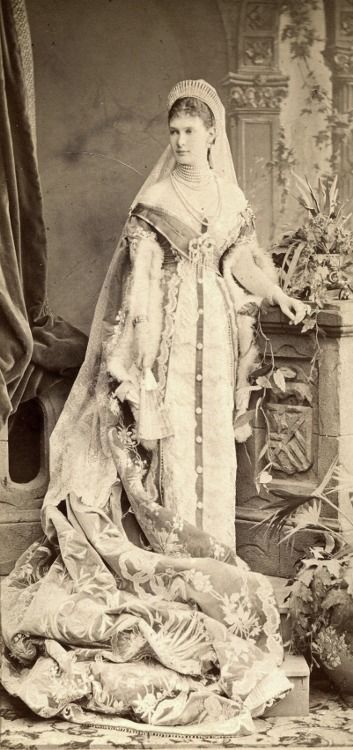
Grand Duchess Maria Pavlovna, the elder, in Russian court dress, 1880s
#1880s#court dress#russian style#19th century#russia#19th c. Russia#mdpcostume#19th c. costume#costume#photography
74 notes
·
View notes
Text

4 notes
·
View notes
Text
Question because I genuinely can't tell, do you guys think I look like my great great grandfather? (I slightly fucked up the quality on my picture so it would be more comparable to his.)

#my ears stuck out way more when i was a kid so that definitely was like his#old photos#1880s#1890s#eastern europe#russia#asia#live from the musain#question
11 notes
·
View notes
Photo
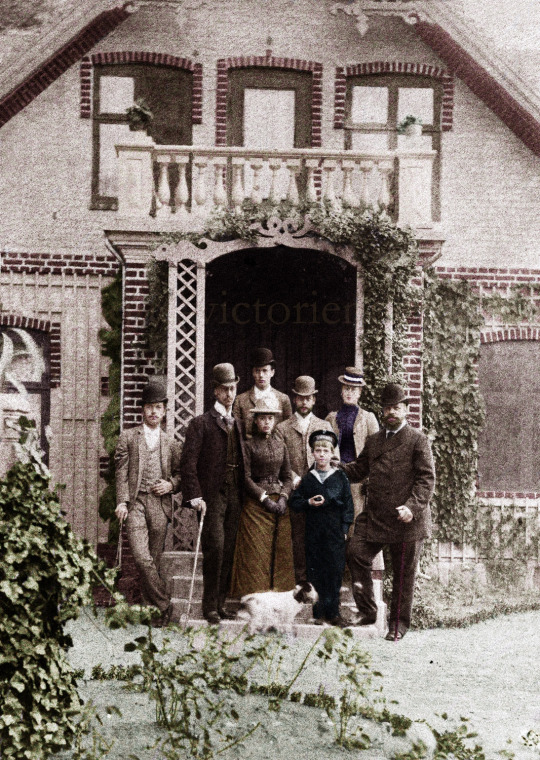
#Colorized Photo#Colorization#Romanov#Russia#Victorian#1880s#Tsar Nicholas II#Grand Duchess Xenia Alexandrovna#Tsar Alexander III
5 notes
·
View notes
Text

Princesses Alix (later Empress Alexandra of Russia) and Irene (Princess Henry of Prussia) of Hesse, 1888.
#princess alix#princess alix of hesse#princess irene of hesse#princess irene#princess irene of prussia#empress alexandra feodorovna#empress alexandra of russia#empress alexandra#romanovs#imperial russia#russian imperial family#british royal family#british royals#german royalty#german royals#1880s#1880s fashion#1888#victorian#colored photography#history colored
99 notes
·
View notes
Text
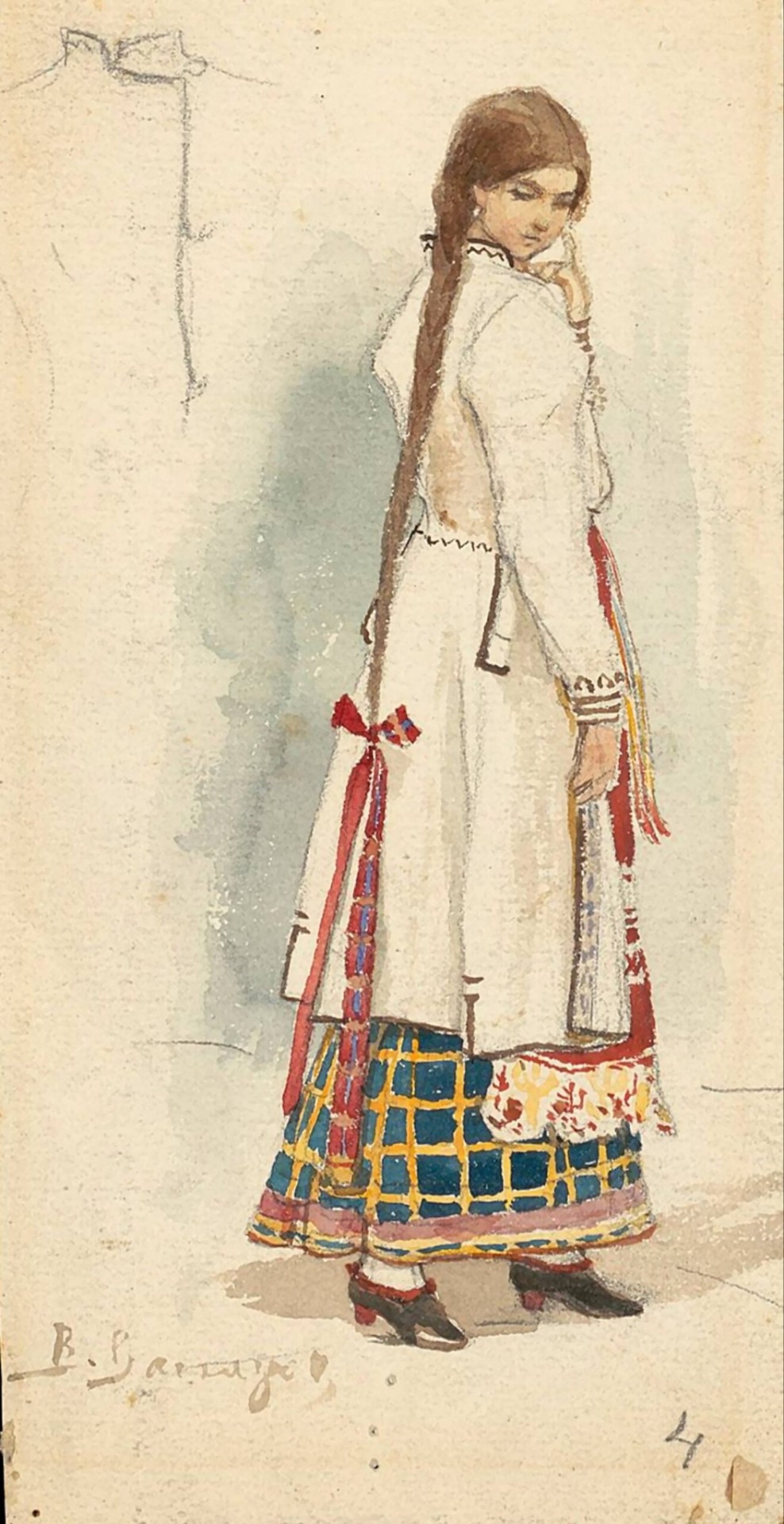
Sketch of Natasha's costume for the opera "The Mermaid" (1884)
Viktor Vasnetsov (1848-1926)
#Россия#Russia#vintage#sketch#illustration#русский художник#russian artist#artist#Виктор Васнецов#Viktor Vasnetsov#русская опера#russian opera#opera#Русалка#The Mermaid#русская культура#russian culture#culture#Europe#русское искусство#russian art#art#illustrations#russian#slavic#european#1880s#1884#19th century
42 notes
·
View notes
Note
why do zionists always assume its antisemitic to think that zionism a settler colonial idea
Modern Zionists aren't actually well-read into their own history. I could invoke the likes of Theodore Herlz, Ze'ev Jabotinsky, David Ben Gurion, and many other political Zionists and how they were ardent supporters of settler colonialism, yet it wouldn't get through their head, because they genuinely believe the land of Palestine is their right to claim, despite the people inhabitating the area. But to claim that the establishment of the Settler state was necessary due to antisemitism is not correct.
The pogrom of the Jewish people in the Pale of Settlement in Imperial Russia resulted in the mass displacement of Jews. But most Jews did not flee to Palestine, but to the US and Western Europe to live relatively better lives, due to the French revolution and so on. They had no desire whatsoever to move to Palestine due to its harsh climate and environment. Although the repression of Jews in the 19th century added to Zionism's appeal, Zionism did not emerge because of it as is often portrayed.
Jewish historian Michael Stanislawiski explains:
The first expression of this new ideology were published well before the spread of the new anti-semitic ideology and before the pogroms of the ealy 1880s. The fundamental cause of the emergence of modern Jewish nationalism was the rise, on the part of Jews themselves, of new ideologies that applied the basic tenets of modern nationalism to the Jews, and not a response to persecution.
-- Zionism, a short introduction (Stanislawski, 2017)
As was the case for that time, the doctrine of nationalism became prevalent across Europe. Many versions of it gained hold of European intellectuals and the upper-classes. One of these were ethnonationalism, which emphasised common ancestry. Such a view was popular among Germans, Hungarians, Russians, Poles and etc, who saw their "tribes" as being distinct, and therefore needed to be preserved from foreign threats. Zionism would mirror some of these aspects, which was prevalent in Eastern Europe. The founding father of Revisionist Zionism (and the precursor to the Likud party), Ze'ev Jabotinsky stated:
"The creation of a Jewish majority, was the fundamental aim of Zionism, the term "Jewish State", means a Jewish majority and Palestine will become a Jewish country at the moment when it has a Jewish majority".
-- Zionism, and the Arabs, 1882-1948 A study of ideology (Yosef Gorny, 1987)
However, there was another ideology emerging which was far more popular among the oppressed Jewish people, which would propell them to emancipate themselves where they lived. Revolutionary Socialism.
According Ilan Pappe, the doctrine of Zionism was vehemently opposed by Jewish leaders all around Europe on the basis of Talmudic violations, the rise of revolutionary socialism and the rise of Jewish assimilationism. Additionally, in a conference in Frankfurt, rabbis decided to omit the mentioning of "the return" from Jewish prayers as a reaction to Zionism. However, Zionism would face intense opposition from Socialist Jews, especially the Bundists, who openly declared Zionism to be anti-Socialist, opportunistic and reactionary. Zionism was an alien idea, and revolutionary socialism emphasised the importance of the liberation of Jews where they lived, resulting in an ideological feud between the Bundists and Political Zionists. Even the likes of the Chaim Weizmann, the first president of the Settler state, and David Ben Gurion, the first PM of the settler state, would condemn the Bundists for their opposition to Political Zionism.
724 notes
·
View notes
Photo

Medieval style earrings, 1880, Russia.
2K notes
·
View notes